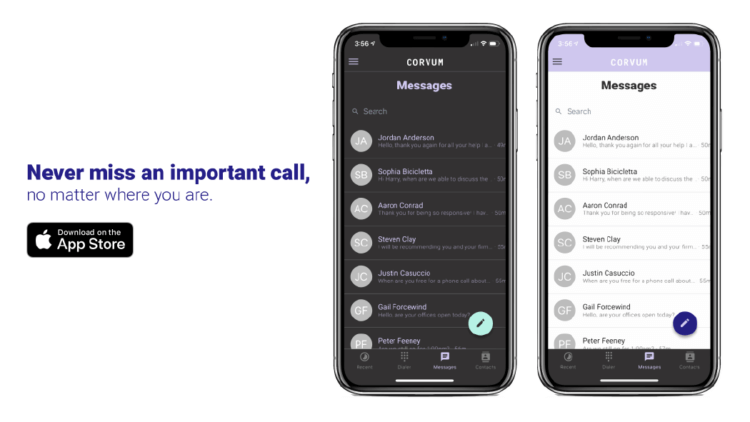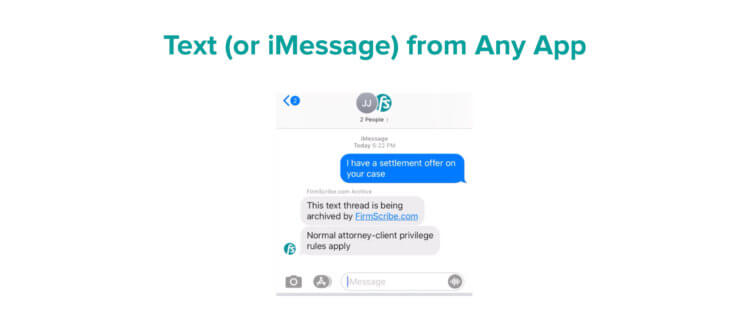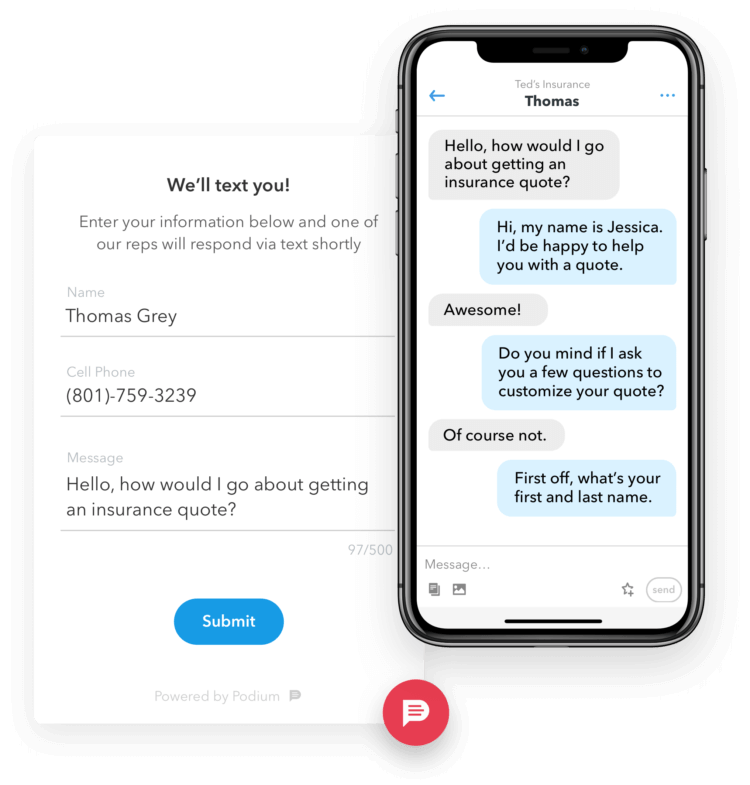Undoubtedly, communicating via text is part of daily life. So if you’re a lawyer who isn’t texting your clients yet, you could be missing out on a powerful way to reach clients and streamline your client communication process. Lawyer texting could make all the difference in a client-lawyer relationship, as it helps you communicate quickly, clearly, and often. When used correctly and under the right circumstances, business texting for lawyers means faster, more effective communication—while also giving clients a better client-centered experience.
In the following guide, we’ll cover the pros and cons of lawyer texting. We’ll also outline important ethical, security, and compliance best practices for attorneys to consider before you start texting with clients. Finally, we’ll highlight some of the top tools that can simplify and enhance security for lawyers texting clients —including Clio Manage’s new text messaging feature!
Should lawyers text their clients?
While texting isn’t appropriate in every situation, lawyers should text their clients when they can. It all comes down to serving clients in the best way possible for them: Today’s clients expect convenience. Texting is already part of our daily lives and it’s the preferred method of interaction for many people. Lawyers should take advantage of this communication platform while taking the necessary steps to ensure they can reap the most benefits from it.
The benefits of lawyers texting clients
Before we look at best practices for the when and how of business texting for lawyers, let’s review the reasons why texting could be useful to today’s attorneys. When you text your clients, you:
1. Provide your customers with a client-centered experience

As Jack Newton’s book, The Client-Centered Law Firm, explains, today’s most successful law firms are client-centered—which means that they prioritize their clients’ experience. When it comes to client experience and communication, texting can give clients what they want. This is because texting is already part of clients’ daily lives, people expect and prefer it.
Lawyer texting doesn’t just benefit clients. It can also enhance overall efficiency at your firm by speeding up responses from clients, who are more likely to reply via text.
Specifically, recent data by Soprano Design published in PC World noted that the response rate of texting is significantly better for texts. Specifically, 90% of people open a text message within three minutes, while 20% of people won’t open an email.
2. Save time and communicate with clients from anywhere
Texting is fast, easy, and convenient. The best part—you can do it from virtually anywhere. The ability to send quick communications via text when you’re working remotely improves your efficiency and makes clients feel better served. Texting also requires a lot less effort than sending an email or phone call.
This increased efficiency for quick communications can be a boon for your firm, as increased productivity ultimately saves law offices money as well.
3. Improve engagement and client satisfaction with clients

It’s just reality: People prefer texting to calling. As Soprano Design’s findings in PC World noted, the majority (85%) of smartphone users prefer mobile messages to emails or phone calls. By giving customers what they want (i.e. texts) when you can (for example, sending a client a text reminding them of a meeting), you deliver a more client-focused experience. This makes clients more likely to respond quickly and feel like they’re getting good client service.
4. Drive new leads and online reviews
Offering the option to text, when appropriate, instantly makes clients more likely to engage with you and respond. This can be key to driving new leads and acquiring new business.
Automating lead nurturing texts for potential clients who visit your law firm website, for example, gives people the ability to initiate contact with your firm via their preferred method of communication.
Similarly, you can also use texts to send review requests in a method that people are more likely to respond to and take action. Consequently, having more positive online reviews means you are more likely to show up where people are looking to hire a lawyer (online and on Google).
Before you start texting your clients

Lawyer texting offers clients and lawyers many benefits as mentioned above. But lawyers need to ensure they are abiding by the rules and their ethical responsibilities. Texting is only one of the many methods of communication for attorneys. It may not work in every situation. Consider the following points before you hit send on any texts to clients.
Are text messages privileged?
Privilege exists when there is an attorney-client relationship. This means potential and current clients should be able to expect communication—through any channel, including text messaging—to remain secure and confidential.
With this in mind, it’s also important to be careful about communicating via text with non-clients about legal matters, as attorney-client privilege could also apply.
Learn more about privileged information, confidential communication, and attorney-client privilege.
Ethics in text messaging
Texting clients carries risks, and there are ethical elements to keep in mind.
As this ABA TECHSHOW article notes, the following considerations are important for lawyers before texting clients:
- Security: Will the text message be digitally secure?
- Documentation: Can you document every text communication in the client file?
- Client needs: Does texting serve the client’s best interest and communication needs?
- Certainty of receipt: Can you be certain that your client received an important text message?
- Lawyer health and safety: Will texting (if you give out your number) negatively impact your personal life and work-life balance?
As Comment 8 of ABA Rule 1.1 notes, it’s a lawyer’s responsibility to stay on top of changes related to the law and the practice of law. This includes the “benefits and risks associated with relevant technology.” With texting becoming a method of communication for clients, lawyers should look for ways to use that technology, while understanding the pros and avoiding the risks associated with lawyer texting.
Of course, text messaging can also help lawyers meet their ethical obligation to keep clients informed. When it comes to client-lawyer relationships, for example, ABA Rule 1.4 (a) requires a lawyer to keep their clients informed on the status of their matter and promptly comply with reasonable requests for information. Because text messaging is fast and more likely to be read, a quick text can help keep a client well-informed and help ensure that you maintain regular communication with clients.
Ultimately, it’s your duty as a lawyer to keep client information secure, so be sure to check and abide by the guidelines for communication for your jurisdiction.
Understand the types of attorney texting
Not all business texting for lawyers is created equal. In general, there are two main types of business texting for lawyers:
- Automated texting: Automated texts help attorneys send out simple communications (such as meeting notifications or providing directions) via text message. These texts save lawyers time while giving clients a good client experience by conveying information in a medium that makes sense for them.
- Two-way texting: Two-way texting means clients can also text lawyers back. With two-way texting, you have more flexibility with what you say. This can be an advantage, but also brings additional considerations: Make sure you use professional language and avoid being too casual when texting clients.
Determine what appropriate lawyer texting looks like
For example, text messaging can save time and be an appropriate way to communicate with clients about topics like:
- Scheduling or sending reminders about meetings
- Court date notifications and times
- Case status updates
- Payment reminders
- Requests for online reviews
Discuss with clients

As with any type of client interaction, it’s important to manage expectations from the start. Clear, open communication is key to successful business texting for lawyers.
Discuss texting with clients and clearly establish which topics are appropriate (and which are not appropriate). For example, texting to confirm a meeting time works, but you should not be texting clients about complex legal issues or personal problems. This ensures that clients are aware that you may text them (and under what circumstances), while also establishing boundaries and making it clear how they might text with you.
By being open to send and receive text messages, you must also help protect your clients from texting inappropriately with a lawyer or from accidentally threatening their client confidentiality. As their lawyer, you must provide clear direction to clients about how and when lawyer texting can work for them.
One way to ensure—in writing—that you and your clients are on the same page with lawyer texting is to add texting to your representation agreement. This sets a solid foundation for lawyer-client communication so that neither you nor your client is surprised, confused, or upset by text communication. Make sure clients know that—just as you would for any other method of communication—you can and will charge for time spent communicating with clients via text.
Security and compliance
It’s your responsibility to protect your clients’ data. Business texting for lawyers—as with any communication channels you use—requires some extra precautions. You need to ensure the data stays secure, client information stays confidential, and you stay compliant.
Here are a few tips to consider:
- Disable message previews. Disabling message previews could also potentially allow others to see messages when they come in. Something as simple as changing the settings on your phone to prevent message previews from appearing on your lock screen can help protect your clients and avoid unwittingly violating attorney-client privilege. Be sure to remind your clients to do the same if they’re texting with you.
- Get a work-only phone. To help keep your work and personal communications separate, you can also consider getting a work-only phone or setting up a work profile (if you have an Android phone). With Clio Manage’s new text messaging feature (discussed below), you can send text messages to your clients from Clio Manage without having to give out your personal phone number.
- Use an encrypted text messaging service. Encryption (i.e., a type of cryptography that scrambles and unscrambles data via an algorithm) isn’t just for emails or secure data storage. It can also help protect text communications. You can start by learning about the basics of encryption for lawyers, then use an encrypted text service instead of regular SMS messaging. See below for potential text message platforms you can use.
- Use a business texting service instead. A secure business texting service such as Signal or Kenect takes the heavy lifting out of keeping your text messages secure. Using tools like encryption, business texting services enhance text security while making the process easier for you.
Documentation and data ownership
It’s essential to save text messages securely in a client file for later reference. While text messaging may feel more informal, lawyer texts are still considered client communication. So, it’s your responsibility to retain copies just as you would with emails or written correspondence.
In addition to your ethical duty to preserve communication for client files, you should also have access to the data. This is in case of investigations or disputes. You can’t rely on your cellular carrier to have copies.
Before you text clients, ensure that your firm has defined procedures for text message documentation. This could be a process for screenshots or using a third-party platform to help automatically archive text messages. Note that taking screenshots to document text messages can be time-consuming and leave room for manual error. Secure legal document management software like Clio Manage can also help by providing storage and organization for data.
Text messaging is part of your communications with clients
All communications with clients are client communications, so keep their best interests in mind when deciding how to communicate with them.
While business texting for lawyers is great for quick communications, it isn’t ideal in every exchange. In certain situations, texting may not be appropriate (even if it’s more convenient). This includes situations like sending documents and sensitive information or discussing a complex issue in a case. Conveying short messages are great for text. But long exchanges are best kept to other mediums. For example, indicating that you’re on your way to a meeting.
A client may also text you with a complex question, with information that you need a more formal record of. They may also text you with something you don’t have time to look into at the moment. In situations like these, don’t be afraid to text them back. Mention you will get back to them later in another method and communication channel. For example, if a client texts you that they want to accept a deal, you could respond to a complex question via text. The text could say, “I’ll look into this and get back to you with an answer as soon as possible.” This way, you can still ensure that clients feel heard, but also respect the limitations of lawyer texting.
You may like these posts
Business messaging tools for lawyer texting
Lawyer texting can be an effective way to communicate with clients, but it’s also more complex than texting with your friends or family. Tech tools can help make lawyers texting clients more effective and ethical.
Here are three reasons to consider using a third-party platform:
- Recordkeeping. Some texting platforms can track your communication history.
- Privacy. Platforms that let you use your office number to text keep your personal number private. This helps protect your privacy and work-life balance.
- Security. Keeping client information secure is essential when business texting, so it’s wise to take advantage of top-notch security provided by certain platforms.
If you’re interested in using tech to simplify the lawyer texting process, the following apps—which are integrated with Clio for added efficiency—can help:
Clio for Clients (Legal client portal)

Make it easy for your clients to communicate and share information with you no matter where they are. With Clio for Clients, your clients can securely receive updates, share documents, and access their case information from their desktop or mobile phone. The best part? Everything is automatically stored to the appropriate matter in Clio Manage for you.
Learn more about Clio for Clients.
Text messaging with Clio Manage
Now, you can text clients seamlessly, without giving out your personal phone number. With Clio Manage’s new text messaging feature, you and your clients can communicate conveniently via text. Clio’s complete set of communication tools means all of your interactions are securely saved in one place.
Learn more about text messaging and text notifications in Clio Manage.
Confirm meetings with text notifications (and reminders) in Clio
Use text notifications to avoid the costly no-shows and overhead that comes with organizing client meetings. Clients can confirm if they plan to attend a meeting so you aren’t left guessing, and automated text reminders save you from having to call or email.
What’s more, with text notifications and reminders in Clio Grow, you can schedule automated text reminders (along with email reminders) for consultations and new client meetings. New clients can also complete intake forms and electronically sign documents by text before coming in for their first meeting.
Corvum Texting

Once a client has access to your personal phone number, it can be difficult to establish boundaries and prevent clients from reaching you during your downtime. Corvum Texting lets you use your firm’s business phone number for texting. This way, you can communicate via text with your existing clients while keeping your personal number private.
Corvum Texting’s cloud technology also helps with text message record-keeping. The service works with Clio to automate posting your text messages to Clio or allow you to download them as CSV/excel files.
ESI-Legal

With attorneys working remotely now more than ever, ESI-Legal’s Cloud Phones for Lawyers offers solutions to streamline and enhance the security of phone communication between lawyers and clients. This includes lawyer texting. ESI-Legal Cloud Phone for Lawyers’ systems include secure text messaging that protects your personal phone numbers. This makes it easier to serve clients from anywhere while maintaining work-life boundaries.
EZ Ring

Platforms that work together streamline procedures and make tasks more efficient. With EZ Ring and Clio, for example, RingCentral users can text clients directly from the Clio interface. This saves you time and making the process of lawyer texting easier.
FirmScribe

Keeping copies of texts (and keeping them organized) is important. But hunting through screenshots of texts isn’t practical. FirmScribe enables lawyers to send business texts from their favorite app (like Messages on iOS or a default Android SMS app) and then sync work texts with Clio. FirmScribe also lets you assign text threads directly to matters in Clio, so you can keep messages organized and easy to find.
Jubilee TextMessaging

Engage with clients via text with two-way text conversations as well as quick appointment reminders or document requests. You can also keep those text messages archived and attached to the corresponding matter or contact in Clio with the Jubilee TextMessaging tool. Created for law firms specifically, Jubilee’s web-based interface is useful for lawyer texting. You can use Jubilee with current and prospective clients in real-time or via scheduled messages. Jubilee is also flexible—you can send messages from your existing office line or through a dedicated text-only phone number. To ensure you don’t miss any text messages, Jubilee also lets you get in-app notifications when you receive a text message.
Podium

Whether you want to use lawyer texting to better communicate with existing or potential clients, or both, Podium can help. Podium converts your firm’s landline into a textable number. Then, the platform’s messaging functionality collects messages from all channels in one convenient inbox. This includes texts, Facebook Messenger, Google Click-to-Message, and Podium’s Webchat. Users can access this inbox from their desktop or mobile device.
These days, reviews are a key part of growing your law firm. Podium assists by enabling you to send automated invitations through Clio and manage your reviews in one spot.
Kenect

Kenect helps law firms leverage business texting for lawyers to increase efficiency, new leads, and client satisfaction. The Kenect platform lets prospective clients text your business via a customizable website widget. Then, it routes those messages to the right person in seconds. This way, you easily capture new leads, but without having to give out your personal cell number.
Kenect also unlocks a key advantage of text messaging—it makes requesting reviews easier and more effective. According to the platform, 35% of customers will leave a review if you request one via text.
Heymarket

Tracking your text history is important, but doesn’t have to require a lot of extra work. Heymarket makes it easy to keep track of business text messaging with your Clio contacts. This lets you view your SMS history of sent and received text messages with clients within each Clio contact’s communications log. And, when you’re texting with new or prospective clients, Heymarket automatically adds incoming text messages to your Clio account. Using Heymarket also lets you export text message history for easier, more accurate billing.
Proclaim

According to the 2019 Legal Trends Report, 57% of clients search on their own for a lawyer. More and more potential customers search online when they are looking to secure legal help. That’s why it’s important to make it easy for clients to initiate a connection with your firm.
Proclaim does just that by making it easier for customers to connect with you via text straight from your law firm website. How? When potential customers visit your law firm website, they can click on a “Text Us” button to connect with your firm via text.
Conclusion
To provide a great client-centered experience for your clients, you need to put their needs and expectations at the forefront of your practice. This includes how you communicate. Since texting is the preferred method of communication for most people today, look for ways to take advantage of business texting services so that you can be more responsive to your clients.
While texting is not suited to complex legal discussions, lawyers texting clients can save time and better serve clients. This is because lawyer texting helps with providing quick communications, setting up logistics for meetings, and requesting online reviews. Carefully consider your responsibilities and having procedures for handling data security and storage (and by using the help of the right business texting services and tools). This way, you can successfully integrate texting into your communication toolkit.
We published this blog post in February 2021. Last updated: .
Categorized in: Technology









